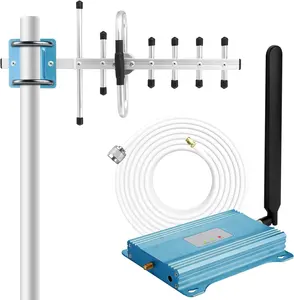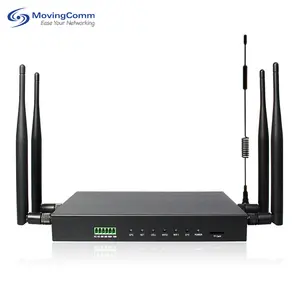What is modem For Gsm Networks
Modems for GSM networks are versatile communication devices that serve as a bridge between mobile devices and the Global System for Mobile Communications (GSM) network infrastructure. They are essential for users who require voice and data services on their mobile devices, enabling connection through various telecommunications technologies including 2G, 3G, and 4G/LTE. Essentially, a modem for GSM networks converts digital signals from a device into a format that can be transmitted over the GSM network and vice versa.
The operation of a modem for GSM networks involves several key principles. Firstly, it must be compatible with the network standards in the region, such as GSM 900/1800/1900 or GSM 850/1800/1900 for 2G connectivity. Additionally, modems employ technologies like frequency division multiple access (FDMA) or time division multiple access (TDMA) to access the network efficiently, depending on the system used by the provider. These devices also incorporate encryption protocols to secure data transmissions and ensure privacy and security.
Modems for GSM networks are designed for a range of users—from individuals who need them for personal use to businesses that require them for commercial operations. They come in various forms, such as portable USB modems that can be plugged into a laptop or desktop computer or as integrated units that can be installed in a vehicle or office building. The effectiveness of a modem for GSM networks is influenced by factors such as network compatibility, data speed, security features, and the device's overall performance.
Types of Modem for GSM Networks
In the market for modems for GSM networks, there are several types available, each suited for different requirements and applications:
-
Fixed Wireless Terminal (FWT): This type of modem is designed to connect to a single computer or a private network within a limited area. It is commonly used in office settings or for residential broadband services in areas where traditional fixed-line infrastructure is not available or feasible.
-
Mobile Wi-Fi Modem: Also known as MiFi devices, these modems create a personal Wi-Fi hotspot that allows several devices to connect to the internet simultaneously. They are portable and ideal for people who need on-the-go connectivity, such as travelers or remote workers.
-
USB Modem: These modems plug directly into a computer's USB port, providing a simple and often more secure means of connecting to the internet. They are particularly useful for laptops and desktops without built-in wireless connectivity or for users who require mobility.
-
Wireless Router: While not a modem itself, wireless routers often come with built-in modems. They are central hubs in Wi-Fi networks, managing traffic between the internet and devices while offering advanced features such as QoS for voice and video streaming.
-
Mobile Broadband Modem: These are designed for on-the-move users who need continuous connectivity over long distances. They often come in the form of USB dongles that can be plugged into a laptop or PC.
Each type of modem has its own set of specifications tailored to meet specific needs, such as fixed location wireless connectivity or high-speed data transmission over mobile networks.
How to choose modem For Gsm Networks
Choosing a modem for GSM networks requires careful consideration of several factors to ensure it meets your business's specific needs. The coverage area you intend to operate in will largely determine whether you need an external or internal modem; for instance, an outdoor application may require a ruggedized modem that can withstand harsh conditions. The nature of the data being transmitted will also influence your choice; critical or sensitive information may necessitate a more secure option like a VPN-equipped modem.
Bandwidth requirements will vary depending on whether you're dealing with simple text messages or more data-intensive media transfers. A modem's ability to handle multiple tasks simultaneously is another consideration – if your operations involve varied tasks demanding different network priorities, a more advanced modem with greater bandwidth allocation may be necessary.
Additionally, consider future scalability. A modem that supports newer technologies like 5G may offer better long-term value by preparing your business for upcoming network upgrades. It's also beneficial to choose a device with reliable after-sales support and maintenance services to minimize downtime due to technical issues.
Remember that Alibaba.com provides filtering options that can help you narrow down choices based on these criteria. You can filter modems by technology features such as Wi-Fi standards, encryption types for security, network protocols like GSM or TCP/IP, WAN ports, LAN ports, etc. This can be especially useful when you're navigating through a vast selection of wholesale modems tailored for different business applications.
About modem For Gsm Networks on Alibaba.com
Alibaba.com stands out as a global marketplace connecting businesses with a vast selection of modems suited for every conceivable need in the realm of telecommunications. With its extensive network of suppliers offering products that range from basic feature phones to advanced 5G technology, Alibaba.com ensures that businesses can find exactly what they require to keep their operations running smoothly. The platform's emphasis on quality assurance through services like Trade Assurance gives buyers peace of mind when sourcing products internationally.
Moreover, Alibaba.com simplifies the purchasing process with its user-friendly interface that supports multiple languages and mobile accessibility. This streamlines negotiations and transactions regardless of location or time zone. With its commitment to helping small and medium-sized businesses thrive through online trade solutions, Alibaba.com has become an indispensable ally for global commerce.
Businesses looking for modems on Alibaba.com benefit from competitive pricing due to wholesale rates offered by suppliers. They also gain access to customizable options that cater specifically to their unique requirements – whether they need modems equipped with high-speed capabilities for data-intensive tasks or rugged devices capable of withstanding harsh environmental conditions. With Alibaba.com's comprehensive approach facilitating easy searchability and secure transactions, businesses can confidently make purchases knowing they have the support of a robust platform designed to meet their needs efficiently and reliably.
Common FAQs for modem For Gsm Networks
What is a GSM modem and how does it work?
A GSM modem is a device that allows computers, tablets, and other devices to connect to a cellular network to access internet and telephony services. It works by inserting a standard SIM card and providing data transfer capabilities over the GSM network.
What types of GSM modems are available?
There are several types of GSM modems including USB dongles, embedded modules, and external modems, each with their specific form factors and integration capabilities to suit various applications.
How do I choose the right GSM modem for my business's needs?
When choosing a GSM modem, consider the network compatibility, data transmission rates required, additional features like encryption or Wi-Fi support, and whether you need an embedded or external modem based on your application's design and integration requirements.
Can I use any SIM card with a GSM modem?
No, you need a GSM modem that is compatible with the frequency bands and SIM card size of the carrier's network to ensure proper operation and avoid issues with connectivity.
What is an embedded module and how does it differ from other modems?
An embedded module is a complete GSM modem integrated into a device or system, offering reduced size and integrated design. It differs from other modems in that it's specifically designed to be used as part of another device or system, saving space and simplifying integration.
What should I consider when choosing a SIM card size for my GSM modem?
Consider the size of the SIM card slot on your GSM modem. Most devices use standard-sized SIM cards, but micro-SIM cards are becoming more common due to their smaller footprint, especially in newer models.
How important is the protocol and standard for a GSM modem?
The protocol and standard (such as Wi-Fi or TCP/IP) that a GSM modem supports determine how it can be used. For example, TCP/IP is necessary for data transfer while Wi-Fi is more suitable for local wireless connections.
Can I use a GSM modem outside of my country?
Generally, GSM modems can be used in other countries as long as they support the frequency bands used by the local cellular networks. It's important to check with the modem manufacturer or the specific operator to ensure compatibility.
How can I ensure the security of data when using a GSM modem?
Choose a modem that supports encryption methods such as WPA2-PSK or WPA3 for secure data transfer. Additionally, ensure that the network ports are properly secured to prevent unauthorized access.
Are there any restrictions on using GSM modems internationally?
While there are generally no restrictions on using GSM modems internationally, it's important to be aware of local regulations and any additional charges such as roaming fees. It is recommended to verify this with your local carrier or the modem manufacturer before traveling.
How do I integrate a GSM modem into my existing system or application?
Integration of a GSM modem involves connecting it to your system or application through standard interfaces like USB or Ethernet and configuring it to work with your software or hardware. The integration process will depend on the specific requirements of your setup.
Can I use multiple GSM modems within the same system or network?
Yes, it's possible to use multiple GSM modems within the same system or network. This can be achieved by configuring each modem appropriately and managing them through a central platform.
What is the significance of having a private mold in a GSM modem?
A private mold refers to a unique design for a GSM modem that is exclusive to a particular company. It can provide a competitive advantage by differentiating a product in the market if it offers specialized features or branding elements.











































 浙公网安备 33010002000092号
浙公网安备 33010002000092号 浙B2-20120091-4
浙B2-20120091-4